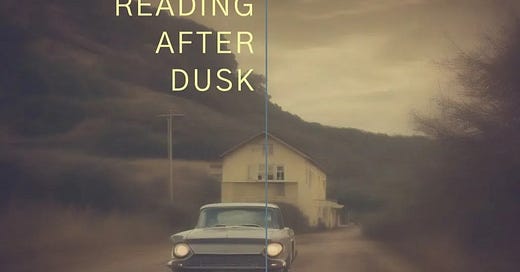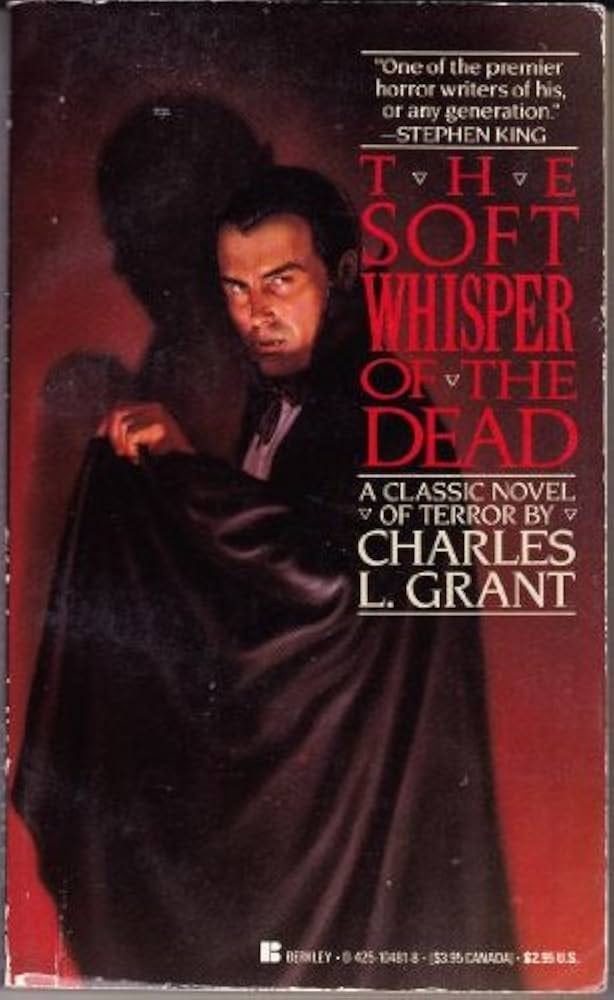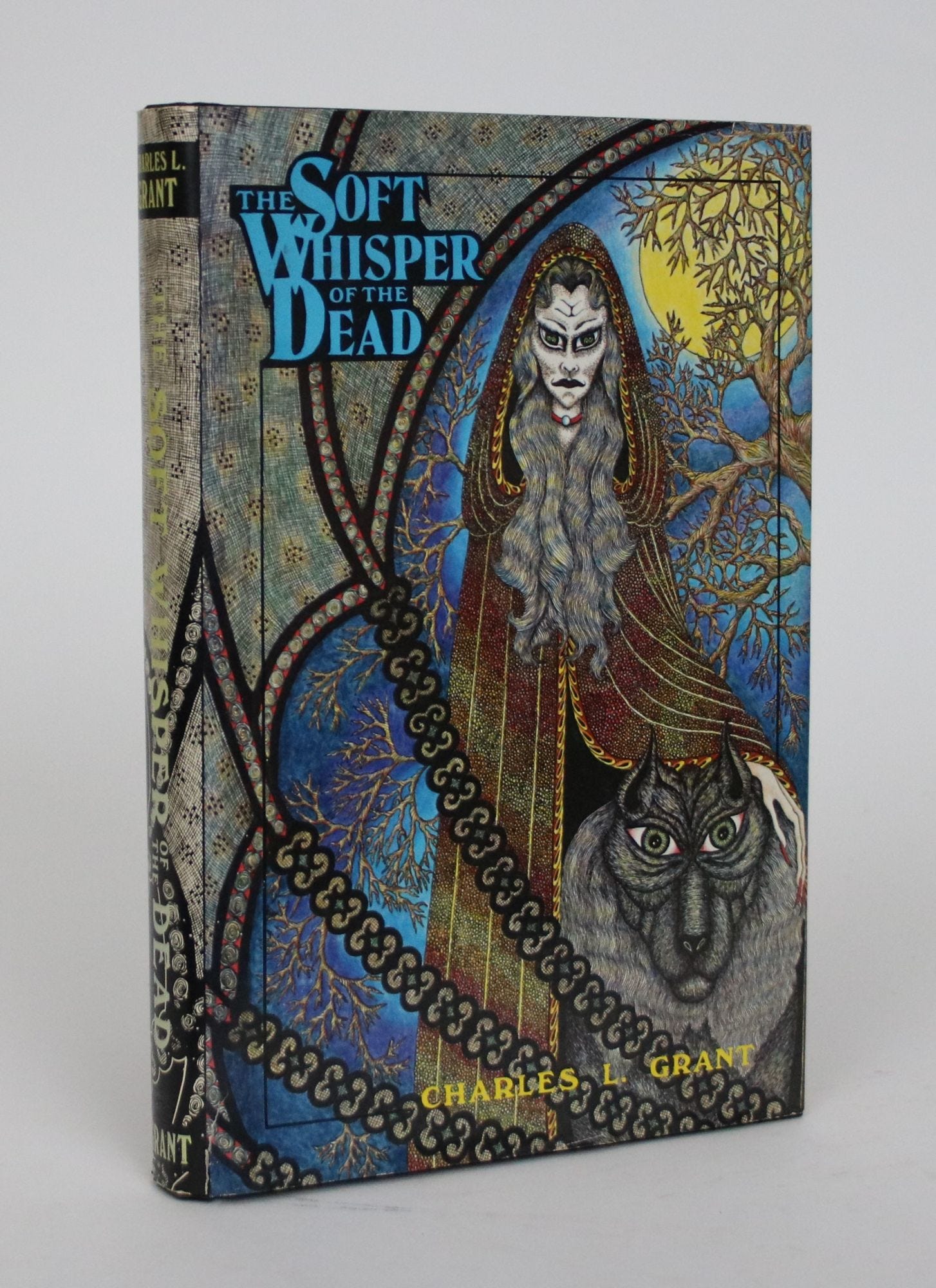Readers unfamiliar with The Soft Whisper of the Dead may wish to read my notes only after reading the novel.
The Soft Whisper of the Dead (1982) is more “Dark Shadows” than Val Lewton or Hammer Films. Rather than the latter's glorious Eastman Color, we have washed-out video of cardboard interiors coupled with had-I-but-known melodrama.
Grant's plot is an economical yet historicized version of Salem's Lot: an ageless vampire makes connections with the family of a small-town New England magnate, and crosses the Atlantic to turn the citizens of Oxrun Station to chattel.
Ned’s right hand trembled violently and reached out as if to grab for the bar, suddenly veered and snapped the delicate chain from around Pamela’s neck. She yelped, but Ned had the tiny silver cross up and in front of them.
“Open it yourself,” he taunted. “Go ahead, Mr. Brastov. Open the door yourself.”
The Count’s face darkened in fury, and his lips pulled away from his gleaming sharp teeth in a silent, enraged snarl. “Put it down, Mr. Stockton. I tell you for your own good to put that vile thing down.” Ned moved forward, and the Count backed toward the stairs.
“Ned,” Pamela whispered, “be careful.”
“It’s all right,” he assured her. “He’s not got us yet.”
Brastov had reached the staircase. His hand took the bannister and in a sudden wrenching motion pulled a section free and flung spinning it at Ned’s head. Ned ducked, but the wood glanced hard off his shoulder, sending him to one knee, pain blurring his vision. But he was able to hold up his hand just as Brastov gathered himself for a leap at his throat.
“No.” Ned gasped, gritting his teeth, his jaw taut. “No.”
There was a silence, until the Count sighed. “I am so sorry for you, Mr. Stockton.” He said as he began to climb the stairs. “I am so very sorry indeed. You think you have the answers, but all they are going to do is provide you with more questions. I suggest you do not think of this as victory.
In fact, it would be a good thing for you, a very healthy thing indeed if you left Oxrun Station first thing in the morning and did not return. If you stay, Mr. Stockton, you will not like what you see. When I am finished, you will not recognize it at all.”
Ned drew back his hand as if to throw the crucifix, but there was a vague crackling sound, a hissing, and when Pamela gasped he looked to the Count’s boots and saw thick mist slipping out from under the cloak. Slowly at first, a death-pale grey, then more rapidly until it enveloped the man, all but the redfire eyes that glared once before winking out.
The wind came immediately after.
It roared down the stairs and scattered the mist, flinging dirt and debris in a hailstorm around their heads, forcing them to duck away and cower against the wall.
And in the midst of the wind, a maniacal laugh.
And out of the wind a monstrously huge bat that dove at them and wheeled, dove again while Ned held up the cross and shoved Pamela between him and the protection of the wall. The bat circled and came a third time, the sound of its wings the sound of the wind. the sigh of the fog. Its eyes were red-fire, its fangs stabbing at his neck, and when Ned swung his arm and the cross struck its chest it spun to one side, hovered, and vanished.
And when the wind was over there was nothing left but silence.
Since this is Gilded Age Oxrun Station, there are no cars or phones. Human activity reveals all motivation, and Grant's strength is found in intimate scenes of longing and confrontation among protagonists. All but one of the villains plays it straight: Snidely Whiplash puffery is absent.
Grant's usual erotic triad (male, female, female) is less erotically charged here than in the novellas collected in The Orchard. There is some nonsexual electricity, however, when Pamela finally confronts Sandra, the childhood friend who has seduced her widowed father.
Her father was below, shouting still at the top of his voice and terrifying the servants.
She blocked out the noise as she climbed, one hand on the bannister, the other gripping the vial. She had no idea what to do with it, but there was no time left to think of a plan. She had to confront Saundra before the house filled, confront her and find out where Brastov was hiding.
She knocked on the door.
There was no answer.
She knocked again. “Saundra? Saundra, it’s me, Pam. I … I want to apologize for what I said last night. It was foolish of me, I know that. I would dearly like to make it up to you. Saundra?” She knocked. “Saundra?”
She tried the glass knob.
The door swung open.
Saundra was standing by the windows, idly brushing her hair. “There’s no need for pretense, my dear,” she said as Pamela entered and closed the door silently behind her. “We both know, don’t we.”
Pamela covered her mouth with one hand, to stop a sob from escaping. “Why?” she asked. “Why?”
Saundra turned, as beautiful and cold as the night framed behind her. “Gregor? Because he loves me, my dear. Because he can give me anything I want.”
“Love?” Pamela scoffed. “What does something like that know about love?”
“Enough,” she said, taking a step forward. And when she smiled, Pamela saw the vampire’s fangs gleaming. “More than enough.” An abrupt hesitation. “You shouldn’t have come here, Pam. You shouldn’t have, you know. In less than two hours it will all be over.” Pamela glanced around the room, trying to think, trying to stall so that Ned could regain his strength and help her. “Rick,” she said suddenly. “Where is Rick?”
Saundra’s lips pursed. “Rick?” she said musingly. “Rick. Ah! You mean that little man who works with your lover?” She walked across the room, backing Pamela away, and stopped in front of a closet. “He thought he knew, too.” she said. “He didn’t know enough.” She yanked opened the door and Pamela screamed.
Rick Driscoll’s body fell out, face down, the skull landing on the carpet with a sickening thud.
“You see,” Saundra told her, “if you drink it all at once, there’s no hope of return. A pity. We might have used him.”
Pamela refused to look at the ghastly white, bloodless corpse. Instead, her left hand buried in the folds of her dress worked to unstopper the vial she held there. “Ned got the others, you know,” she said bravely, her chin up, not quite quivering. “Pierson and the others, he got them.”
Saundra only nodded. “So I would gather. But while that’s unpleasant, Pam, that’s not the end. There’s another, you know.”
It took her a moment before she said, “Horace. Lord, I forgot about Horace.” Saundra shrugged. “If you say so.” Then she looked toward the clock on the mantel. “But now I must go, darling. There are guests to greet, and your father to keep happy. “
Pamela growled low in her throat and pulled out the vial, the stopper falling to the floor. Saundra glanced at it idly, did not stop walking.
“No,” Pamela said, moving quickly to stand in front of the door. “No, you’re not leaving here.”
“Please, Pam, don’t make this difficult. Your time will come.”
“Not if I can help it.”
“Pamela, you’re being silly. There is no stopping the inevitable and you know that as well as I do. Just step aside, dear, and I’ll be sure that Gregor treats you well.” Another smile, and the teeth, and the breath of the dead. “I think it would be fun to be together, forever, don’t you? Yes, I think it would be great fun indeed.”
Pamela shook her head rapidly, fear trapping her words in her throat.
Saundra glared. “All right, if you insist.” She drew herself up. “Do you like wolves, Pamela? Do you like wolves?”
Pamela stared as the woman’s form began to shimmer and her face slowly mingled with the face of a black wolf. She wanted to cry out, she wanted to scream, but nothing she thought of could stop the transformation — until she remembered the vial in her hand.
Suddenly, with a shouted “Damn you!” her arm snapped up and the water flew across the space between them. The vial dropped to the floor, and shattered while she watched, horrified, at the results.
Saundra shrieked as the liquid splashed into her face. Her hands snapped up to rub at the fire there, pulling away great strips of burning, melting flesh. Bone poked through her cheeks. Her eyes widened as her hair caught fire. The dress smoldered and burst into flame. She shrieked again and staggered backward, hands flailing now as the blessed water shredded her lips. A foot caught the leg of a chair and she was tossed backward, her hips slamming against the window sill. Her arms shot up one more time, high out of the flames, fists damning heaven as she catapulted through the pane. Silently. Slowly.
Pamela raced to the window and leaned out, just in time to see Saundra crash through the greenhouse roof and land on a pedestal that once held winter roses. The force of the fall slammed the marble into Saundra’s back, trapping her, impaling her as the fire did its work, the flames gouting up once before subsiding and dying.
“Oh my god,” Pamela whispered, “Oh my god.”
“I think, my child, it’s a little late for that.” And when she turned, Gregor Brastov stepped into the room.
* * *
This being Charles L. Grant, the reader's eyes are turned away from scenes of vampire carnage. This distinctly lowers the stakes (no pun intended). There is no Danny Glick to mourn, no Charlie Rhodes to laugh over: no possibility of emotional investment.
And Grant tidies up the story far too quickly – ending with a chandelier accident.
Since 1999 Universal has been trying to create a profitable “Monsterverse” with overblown and over-hyped blockbusters. The Soft Whisper of the Dead is weak as water in comparison, though just as poorly conceived.
Jay
30 January 2025





